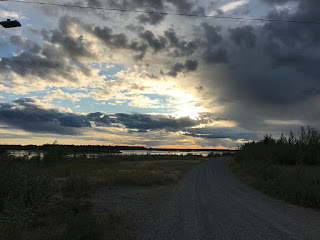I spent much of my first week here fuming, fighting competing urges of desperation and muted anger. It felt like I was an animal lured into a trap, railing at the edges of my cage with fury and no means of escape. I'd been lied to. I'd been misled. I'd been tricked. And now they had me.
"Wait until school starts," advised Miss Sunday. She is a long-suffering but upbeat district employee who became an early friend. "I understand why you're frustrated. I see what the problems are. But once the kids are here it will get easier."
I had my doubts as to that. Many words have been used to describe the experience of teaching children in rural Alaska, but "easy" is seldom one of them. Domestic violence, rampant alcoholism, sexual abuse, and systemic dysfunction make for classrooms that can be outright hellish. Last year I taught a group of 7th-graders whose behavior was so horrific that we added a period to the school day, disrupting the schedule of the entire student population, for the express purpose of splitting the single cohort. Even then the rooms were still largely unproductive, and that wasn't considered abnormal for the bush. I counted myself lucky that by the end of the year no one had thrown a desk at me. It's been known to happen.
You can imagine my flummoxed reaction when the adolescents who actually greeted me on Tuesday morning were...pleasant. Nice. Polite. My 8th-graders are deferential little fellows who laugh at my bad jokes and enjoy coloring. My 11th- and 12th-graders are so curious and intellectually advanced that I'm having to retool their curriculum, making it more reflective of the abilities of this group of teens who seem like something right out of the Lower 48. The most challenging group, a class of 9th- and 10th-graders, find social studies boring. And occasionally some of them talk too much. That's it.
"My worst class here is a cake-walk compared to my worst class last year," I marveled to Miss Silver, a long-time teacher who, like me, has served in several villages.
"Oh, yeah," she nodded knowingly. "People who have never taught in other villages before don't understand that. They think this is rough. This is great."
Not without its interruptions, though; on the very first Friday of the school year some of my high-schoolers opined, to my face, that they were going to ditch my class, but gave assurances that they had the best of reasons.
"Someone found a dead bear. Can we see?"
Off we went.
I was two days in with these decidedly non-rough kids when I swung by the office of the superintendent, Mr. Spear, with a retraction.
"If you haven't found anyone to fill that position yet," I said. "Just let it go."
"Well," he observed. "We weren't really looking."
True to form.
"The kids are good," I responded. "They're really good."
He leaned back in his chair and flashed me a sentimental smile.
"Is this the part where I get to say 'I told you so'?"
I flashed him a saccharine smile in return. "My problem was never with the kids."
To call the management of this district a clusterfuck would do a disservice to better-run operations with that moniker, like the Department of Motor Vehicles and the VA. But for all the issues emanating from the top, technology access paramount among them, there is much to recommend Point Goldlace. My house is beautiful and modern (and a genuine Alaska log cabin at that). My kids are personable and good. My principal is accommodating, if a bit too eager to endear himself (and that trait always, always, makes me wary). My health insurance is amazing and my pay is, well, fantastic. And, more to the point, this community is actually a community.
Back in Gori, which I loved, I fell into the pattern of the Triangle Teacher: I went from work to the store to home, and back and around again. It was an isolating circuit that led many of us, myself included, to compare teaching in the village to being stationed on a military base. We were in the town but not of it.
Here it's been easier to do things. Every Friday the school hosts a movie night, the first of which I attended this week, and additional opportunities for socializing abound in the town's several churches. At one of them, on the tail end of our first school week, I encountered what can only be described as a divine presence.
"I am literally getting emotional over this latte," I said by way of apology to the twenty-three-year-old barista. "But you don't understand. I love going out for coffee. It's one of my favorite things. And I never get to do that out here."
She laughed. "No, I get it. We only even have the setup because someone donated it, and we figured we might as well make some money to support the youth group."
Church Girl smiled and handed me my cold drink. "There you go."
"Did I just see you walking across town with an iced coffee?" Miss Sunday texted mere minutes later. "Where did you find such loveliness?"
And that is how, on an early fall evening in the taiga wilderness more than 100 miles north of Aurora City, I found myself hanging out at a cafe after work, exchanging silly banter with my co-worker and the twentysomething workers running the place. Church Girl chirped pleasantly about my students, several of whom are frequent visitors. Church Guy, a boyish twenty-seven-year-old, threw in wacky stories from his family's early years in this community, and before long we were all laughing over our drinks.
A little slice of normal. A small bit of belonging.
As always, I have no idea what my future holds. No idea how long I'll be in this place, this state, this profession. No idea what's coming down the pipe. What I do have are conflicted ideas about plenty of things, things that deserve their own reflections. But for now, by choice, I'm here. God knew to ignore my prayers for a quick exit because He knew what was best for me. That's a truth I'll try to more consistently remember.










